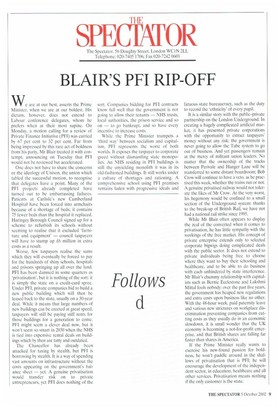SPE rli CATOR
The Spectator. 56 Doughty Street, London WC1N 2LL Telephone: 020-7405 1706; Fax 020-7242 0603
BLAIR'S PFI RIP-OFF
We are at our best, asserts the Prime Minister, when we are at our boldest. His dictum, however, does not extend to Labour conference delegates, whom he prefers when at their most supine. On Monday, a motion calling for a review of Private Finance Initiative (PFI) was carried by 67 per cent to 32 per cent. Far from being impressed by this rare act of boldness from his party, Mr Blair treated it with contempt, announcing on Tuesday that PFI would not be reviewed but accelerated.
One does not have to share the concerns or the ideology of Unison, the union which tabled the successful motion, to recognise that delegates have a point. Many of the PFI projects already completed have turned out to be embarrassing failures. Patients at Carlisle's new Cumberland Hospital have been forced into armchairs because of a shortage of beds; it contains 75 fewer beds than the hospital it replaced. Haringey Borough Council signed up for a scheme to refurbish its schools without seeming to realise that it excluded 'furniture and equipment' — council taxpayers will have to stump up E6 million in extra costs as a result.
Worse, few taxpayers realise the sums which they will eventually be forced to pay for the hundreds of shiny schools, hospitals and prisons springing up all over the land. PFI has been damned in some quarters as 'privatisation', but it is nothing of the sort: it is simply the state on a credit-card spree. Under PFI, private companies bid to build a new public building which will then be leased back to the state, usually on a 30-year deal. While it means that large numbers of new buildings can be erected at great speed, taxpayers will still be paying stiff rents for those buildings for a generation to come. PFI might seem a clever deal now, but it won't seem so smart in 2030 when the NHS is tied into expensive rental deals on buildings which by then are tatty and outdated.
The Chancellor has already been attacked for taxing by stealth, but PFI is borrowing by stealth. It is a way of spending vast amounts on infrastructure without the costs appearing on the government's balance sheet — yet. A genuine privatisation would transfer risk on to private entrepreneurs, yet PFI does nothing of the sort. Companies bidding for PFI contracts know full well that the government is not going to allow their tenants — NHS trusts, local authorities, the prison service and so on — to go bankrupt, and so have every incentive to increase costs.
While the Prime Minister trumpets a 'third way' between socialism and capitalism, PFI represents the worst of both worlds. It exposes the taxpayer to corporate greed without dismantling state monopolies. An NHS residing in PFI buildings is still the unyielding monolith it was in its old-fashioned buildings. It still works under a culture of shortages and rationing. A comprehensive school using PFI premises remains laden with progressive ideals and fatuous state bureaucracy, such as the duty to record the 'ethnicity' of every pupil.
It is a similar story with the public-private partnership on the London Underground. In creating a hugely complicated artificial market, it has presented private corporations with the opportunity to extract taxpayers' money without any risk: the government is never going to allow the Tube system to go out of business. And yet passengers remain at the mercy of militant union leaders. No matter that the ownership of the tracks between Perivale and Hanger Lane will be transferred to some distant boardroom; Bob Crow will continue to have a veto, as he practised this week, whether the trains run or not. A genuine privatised railway would not tolerate the likes of Mr Crow, At the very worst, his hegemony would be confined to a small section of the Underground system: thanks to the break-up of British Rail, we have not had a national rail strike since 1995.
While Mr Blair often appears to display the zeal of the converted when it comes to privatisation, he has little sympathy with the workings of the free market. His concept of private enterprise extends only to selected corporate bigwigs doing complicated deals with the public sector. It does not extend to private individuals being free to choose where they want to buy their schooling and healthcare, and to be able to do business with each unhindered by state interference. Mr Blair's chummy relationship with capitalists such as Bernie Ecclestone and Lakshmi Mittal fools nobody: over the past five years, the government has heaped new regulations and extra costs upon business like no other. With the 48-hour week, paid paternity leave and various new strictures on workplace discrimination preventing companies from cutting costs as they usually do in an economic slowdown, it is small wonder that the UK economy is becoming a not-for-profit enterprise, and that British shares are falling far faster than shares in America.
If the Prime Minister really wants to exercise his new-found passion for boldness, he won't paddle around in the shallows of privatisation that is PFI; he will encourage the development of the independent sector, in education, healthcare and all other services. Privatisation means nothing if the only customer is the state.




































































 Previous page
Previous page